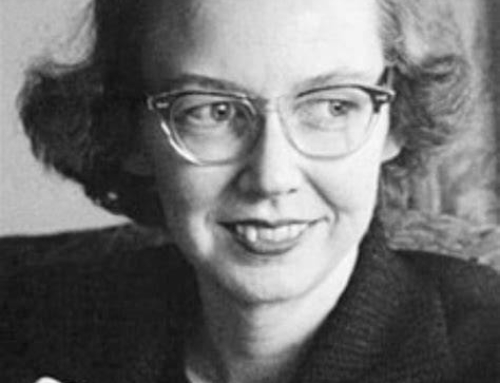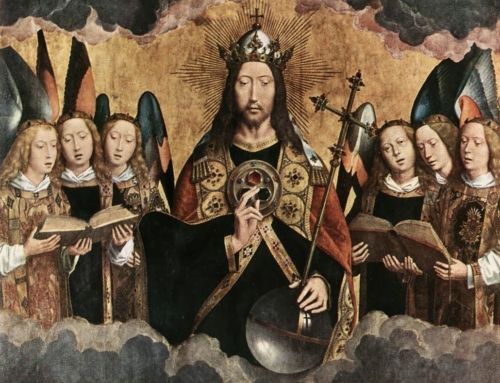People who know my story realize I am a graduate of the fundamentalist Bob Jones University.
It’s pretty much of a stretch therefore that I not only ended up as a Catholic priest, but I was ordained and now serve here in Greenville, South Carolina on the doorstep of BJU.
Sometimes people ask if there is animosity between us. There isn’t any on my part, but I can certainly understand their point of view if some people from that world regard me as a traitor, a heretic and a seriously deluded person. I get it.
For my part, I have always thanked God for my strong Evangelical upbringing and I have always seen my progress from Bob Jones University to the Catholic priesthood as being a case of simply adding more to the riches I had received in that world. I’ve outlined that in my book More Christianity--which explains the Catholic faith not as something essentially different from Evangelical religion, but something more.
Protestantism is, after all, a reductionist movement. The Reformers were sincere in their attempts to prune back the excesses, the extra traditions and superstitions of medieval Catholicism. Everything good in Protestantism is derived from the fullness of the faith in the Catholic Church, so becoming first an Anglican, and then a Catholic, and then a Catholic priest was a matter of adding more and more to my faith–not reducing it or changing it in any essential way.
Of course, in this pilgrimage the Blessed Virgin Mary looms large. Fellow convert Kimberly Hahn was asked what were the three things that were the biggest problem for her as she became Catholic. She is quoted as saying, “Mary, Mary and Mary.” The sincere Protestant really believes that Catholics put the Blessed Virgin Mary where Jesus should be. This is probably the biggest problem for most Evangelicals about the Catholic faith.
I confronted these problems in my discussions with a fellow Bob Jones graduate, David Gustafson. We wrote a book together which was our conversation about Mary. The first edition was called Mary-A Catholic Evangelical Debate. It went out of print, but I have recently re-published it as Our Lady?-A Catholic Evangelical Debate. I think it still stands as the best book on the subject which is treated in this way. David and I discuss all the Marian doctrines and the book really does not only help Evangelicals understand the Catholic beliefs, but it also helps Catholics understand and sympathize with Protestant objections.
As we celebrate the Immaculate Conception this week, it is worth explaining why Protestants object to the Marian dogmas. First of all, most of them don’t understand the Immaculate Conception. Many think it is the same thing as the Virgin Birth. Some think it has to do with the Annunciation and the conception of Jesus in Mary’s womb. Others confuse it with the doctrine of the perpetual virginity of Mary.
However, when I have explained it to Evangelicals very few object to it. I explain it like this: Jesus is God’s Son. They agree. He took his human flesh from Mary. Sometimes there is confusion about this because many Evangelicals (innocently) have a docetic view of the incarnation…that Jesus was a kind of squeaky clean superman who sort of slid through Mary’s body as if it were a conduit into this world. But once they think it through they usually see that an orthodox view of Jesus means that he took his flesh from his mother. If he took her human flesh it had to be free from any taint of original sin otherwise he would also share in that sin and would not be the perfect Son of God. So far so good. Therefore we believe that God preserved Mary from any taint of original sin. The only remaining question is “When did that happen”? Logic points us to say it must have happened at the beginning of Mary’s life and if life begins at conception, then it began when she was conceived (by natural processes between her mother and father).
Once Evangelicals understand this dogma they usually do not object so much. They object (as I did) that the Catholic Church has declared it to be a dogma which must be held by the faithful. They prefer that we had kept it as a pious opinion. That was my view also until I finally came to believe in the Immaculate Conception not only with my head but also with my heart. I have recounted that story before. You can read it here if you wish in a blog post entitled Fr Paul, Fried Chicken and the Immaculate Conception.
The Immaculate Conception is therefore a great gift to the church. Why do Catholics insist that it is a dogma that must be held by the faithful and not simply a pious opinion? It is true that a full understanding of the Blessed Virgin Mary is necessary for a full and complete understanding of the identity of Jesus Christ her Son. When we come to understand fully Mary’s role in redemption we can accept and affirm most fully the work that Jesus Christ has done.
In other words, knowing, understanding and loving Mary helps me have a closer personal relationship with Jesus.
Or as Catholics would put it: Through Mary to Jesus.







I wonder how many Catholics understand the true meaning, the necessity, for Mary to be conceived without original sin – the Immaculate Conception so she could be the Mother of God? Christ is indeed True God and True Man by the power of the Holy Spirit and Mary. You know that of course, Father, just establishing a base.
My question is what did BJU and other Protestants have to say about Luke Chapter 1? Surely Mary is well established as the Mother of Jesus who is indeed the Son of God. How can anyone relegate her to a rather minor role in our salvation? What if she said ‘no’ to Gabriel? I thank God Mary said ‘yes.’
Once we understand that Mary is the Mother of Jesus, the Living Son of God, we are in a place to better understand the Immaculate Conception.
As a former Protestant who is currently attending RCIA classes with an Easter Vigil confirmation, I too struggle at times with the Catholic view of Mary. I have no issue with the Immaculate Conception, asking for Mary to pray for us, etc. However, when I read Catholic prayers to Mary, they seem to many times use words which suggest that she is more than just a great intercessory between us & her Son but has deity like powers & authority:
Examples:
“Most holy Mother, send thy angels to defend us and to drive the cruel enemy from us.”
“Despise not our petitions in our necessities, but deliver us always from all dangers.”
“Hasten the conversion of sinners that they may love Jesus and cease to offend the Lord, already so much offended”
“Therefore, in my affliction and agony I present myself with confidence before thee,
our most loving Mother, and I pray thee to make me experience the love which thou bearest us;
Grant me (specify the favor) if it be the Will of God and for the good of my soul.”
I agree that these devotions seem excessive. They must be placed in their historical and theological context. Most of them come from a church infected with excessive puritanical viewpoint in which Jesus was only the fearsome judge and Mary therefore became the merciful mother. You might like to read my book Mary-A Catholic Evangelical Debate–in which I discuss this and other issues with a fellow BJU graduate. As a subscriber you get a discount on the book purchase, but if you want a copy but can’t afford it I’ll happily send you one. Just drop me an email: dlongenecker1@gmail.com